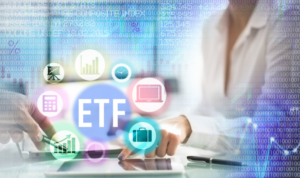 What is an ETF?
What is an ETF?
An exchange-traded fund (ETF) is a type of investment that lets you invest in a number of different shares or bonds. They typically track a specific index, sector or basket of commodities, aiming to replicate them as closely as possible. They do this by holding the same underlying assets as the part of the market they are trying to replicate. In this respect, they work in much the same way as a mutual fund tracking a particular index.
The key difference is that ETFs are traded on stock exchanges, meaning shares in individual ETFs can be bought and sold by investors. This means the price of the ETF will fluctuate throughout the day as it is traded. In addition to this, ETFs are often passively managed and therefore often come with lower fees when compared to mutual funds.
What are the key features of an ETF?
- Good levels of diversification as they contain a large number of companies or bonds
- Typically cheaper than index funds and other fund types and often require a lower minimum investment
- Traded on a stock exchange and are, therefore, easily bought and sold
- Can be passive or actively managed, although the majority are passive
- Can hold most ETFs within a stocks and shares ISA
- As with any investment, their value can go up and down over time
How do ETFs work?
An ETF will generally replicate indices or specific parts of the market by physically holding the same assets. The three main types of ETFs are as follows:
Physical ETFs
A physical ETF aims to track an index by holding all of the companies that make up the index. It does this by working with an institution like an investment bank, which works on the ETF provider's behalf to buy the underlying assets of the part of the market they are looking to replicate.
Synthetic ETFs
Another option is a "synthetic" ETF, which uses "swaps", which are an instrument that pays the same returns as the underlying investments the ETF is tracking. These types of ETFs are usually associated with commodities or foreign exchanges that don't allow foreign investment. This is because they allow replication in situations where buying the actual physical assets would be difficult or impossible.
Active ETFs
An "active" ETF is run by a manager, whose job is to choose the assets included in the portfolio and the weightings to the individual holdings. Active ETFs generally have higher fees attached to them than their passive counterparts.
Take a listen to the Money to the Masses podcast episode 446 where we explain some of the differences (as well as some of the drawbacks) between "physical" and "synthetic" ETFs.
Mutual funds vs ETFs
Mutual funds and ETFs both offer a low-cost way to invest in a basket of assets thereby lowering your risk through diversification. The key difference between the two is that ETFs are often treated like stocks and can be traded throughout the day with the price fluctuating. Mutual funds, on the other hand, can only be bought at the end of the day when the market closes based on their Net Asset Value (NAV) for the day.
Another rule of thumb is that ETFs are typically passively managed and therefore offer lower costs, while mutual funds are typically actively managed and designed to beat the market and therefore come with higher costs.
In the table below, we compare the key similarities and differences between ETFs and mutual funds.
| ETFs | Mutual funds |
| Typically passively managed (could track an index like the FTSE100, for example) and designed to replicate returns from the chosen index or market | Typically actively managed by fund managers who often attempt the beat the market and deliver better returns than passive funds which simply replicate the market |
| Often cheaper with Fidelity's cheapest ETFs costing as little as 0.03% per annum and up to 1.08%. Many platforms also cap platform fees for ETFs (where they don't always do so with mutual funds) | Can be more expensive partly because they're often actively managed (Fidelity's cheapest mutual funds start from 0.05% per annum but can cost up to 3.11%) |
| Can be traded like stocks on the stock market during regular market hours. | Not traded on the stock market; can only be bought and sold at the end of the day based on the fund's Net Asset Value (NAV). |
| Typically lower minimum investments than mutual funds. | Minimum investments can be higher meaning investors need a bigger lump sum at the outset. |
| Can be held within a stocks and shares ISA | Can be held within a stocks and shares ISA |
| Offers diversification and therefore lowers overall investment risk | Offers diversification and therefore lowers overall investment risk |
How to invest in ETFs
One of the best and cheapest ways to invest in an ETF is through an ETF specialist platform such as InvestEngine. It currently doesn’t charge any platform fee for its DIY investment portfolios and those who invest at least £100 can receive a welcome bonus of up to £50. Terms and conditions apply.
Alternatively, you could look at larger platforms that offer a wider selection of investments, such as Interactive Investor*, Hargreaves Lansdown*, or AJ Bell*. You could also consider a trading platform like Freetrade*, Trading 212 or eToro. The choice between them will largely depend on what else you want to invest in within your wider investment portfolio, as well as weighing up the products and services they offer and the fees they charge. For a more detailed run down, read our article 'What is the best way to invest in index funds or ETFs?'
Once you have chosen your platform, you can move on to working out which is the best ETF for you, or whether you want to invest in more than one. To do this you should consider:
- Are you looking to target a specific area of the market? Are you looking for the broad diversification offered by one of the main indices, such as MSCI World, S&P 500 or FTSE100, or would you prefer to target a specific sector?
- What level of risk can you tolerate? Does the ETF match your risk appetite? How does it work with other investments you have?
- Are you looking to buy and hold or do you anticipate you will be trading more frequently? If it's the latter, you need to consider the trading fees charged by your platform.
Most platforms offer a search function, which allows you to screen the various ETFs on offer. There may also be independent research or recommendations, depending on the individual platform. If you are unsure about the best option, it is worth consulting with a financial adviser, who can work out your individual needs and also assess how an ETF could fit within your wider portfolio.
How much do ETFs cost?
One of the most appealing things about ETFs is the fact they are low-cost. Indeed, the average fund charge for a passive ETF or index fund is around 0.15% - £150 per year for every £10,000 invested - compared with 0.67% for active funds.
Platform charges
If you are investing through a general investment platform, you will normally either pay a percentage of the total amount you have invested per year, or you will pay a flat monthly fee. Some platforms cap the amount they charge for ETF investments which can significantly lower the fees you pay particularly if you have a larger portfolio. Platforms with pricing caps include:
- InvestEngine doesn't charge a platform fee at all for investors choosing their own investments
- Fidelity caps its platform fees at £90 per year for ETFs (otherwise 0.35%)
- AJ Bell* caps platform fees at £3.50 per month for ETFs (otherwise 0.25%).
- Vanguard Investor caps its platform fees at £375 per year for ETFs (otherwise 0.15%)
- Hargreaves Lansdown* caps its platform fees at £45 per year for ETFs (otherwise 0.45%) when investing via a Stocks and Shares ISA. There is no platform fee at all for investing in ETFs in its non-ISA trading account.
With a trading platform there is often no platform fee, but you may be charged for withdrawing your money or for currency conversion.
Trading charges
If you opt for a trading platform, you often won't have to pay anything for buying or selling ETFs as they make money from the "spread", which is the difference between the buy price and the sell price. This can work out to be cost-effective if you are planning to take an active approach to your portfolio, making frequent changes.
For general investment platforms, meanwhile, there will generally be trading charges for each transaction you undertake. For example, Hargreaves Lansdown charges £11.95 for each deal, although this is reduced if you make a certain number of transactions per month. To find out more, read our round-up of the cheapest platforms.
Pros and Cons of ETFs
Below, we outline some of the key pros and cons of ETFs.
Pros of ETFs
- Low cost compared with other investment types
- An easy way to introduce diversification into your portfolio as you can include all of the companies in a particular index or sector
- Readily available and easy to buy and sell as they are traded on stock exchanges
- Can provide access to more esoteric assets that you may not be able to invest in directly
Cons of ETFs
- Depending on the platform you use, the trading costs involved in buying and selling ETFs can start to add up, especially if you make frequent changes
- There is a risk, particularly with synthetic ETFs, of the financial institution facilitating the construction of the ETF going bust. Although this "counterparty risk" is small, it is something investors need to be aware of
- The price of an ETF can fluctuate and the value of your investment can go down as well as up, as with other investments
Summary: Should you invest in ETFs?
ETFs have become an increasingly popular option among investors, who are drawn to them because of their low cost and the diversification they can provide. Indeed, many robo-advisers, such as Nutmeg and Wealthify, primarily use ETFs and index funds to populate their risk-rated portfolios because of these characteristics.
Whether an ETF is right for you largely depends on which specific ETF you choose and how it fits in to your wider portfolio. By their nature, they take on the features of the part of the market they are representing and their price will move accordingly. There certainly isn't a one-size-fits-all with ETFs and it pays to do your homework - or get advice from a financial adviser - to see how you could successfully incorporate them into your portfolio.
If a link has an * beside it this means that it is an affiliated link. If you go via the link Money to the Masses may receive a small fee which helps keep Money to the Masses free to use. But as you can clearly see this has in no way influenced this independent and balanced review of the product. The following link can be used if you do not wish to help Money to the Masses - Hargreaves Lansdown, AJ Bell, Interactive Investor, Freetrade



